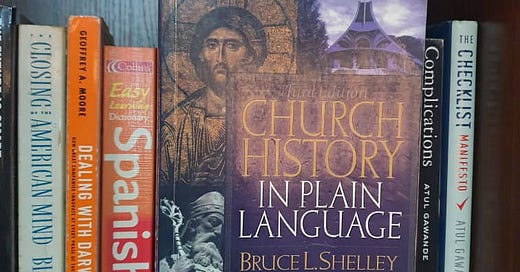Book Review: Church History In Plain Language by Bruce Shelley
"Christianity is the only major religion to have as its central event the humiliation of its God."
Hello Reading Buddy.
Can you do me a favor? Please subscribe to my Youtube Channel, it would mean a lot to me.
Thank you very much.
Now, let’s get to the review.
Book Review: Church History In Plain Language by Bruce Shelley
"Christianity is the only major religion to have as its central event the humiliation of its God."
That's how this book begins. These words hooked me up. Reading through Church History In Plain Language was not disappointing. It is a rich and daring book. Think about summarizing 2,000 years of history into 500+ pages. One must be very good at summarizing and at history.
The author satisfied both requirements.
Church History in Plain Language is the story of Christianity. A story that began 2,000 years ago in modern-day Palestine. During the last weeks of Jesus' life, the period called "The Passion Week," I am sure if you asked anyone present, "what do you think will happen to this man and his followers?" any rational person would have said, "They will be dead and gone." Yet, 2,000 years later, the Roman Empire has collapsed, Caesar has been relegated to history books, and all the figures in that era are dead and gone, but the message of Jesus had conquered the world. This band of rabid rousers eventually changed the world.
This book is divided into 8 Parts
- The Age of Jesus and the Apostles
- The Age of Catholic Christianity
- The Age of the Christian Roman Empire
- The Christian Middle Ages
- The Age of the Reformation
- The Age of Reason and Revival
- The Age of Progress
- The Age of Ideologies
Each part covers a major period in Christian history. As you read through, you will see how Christianity grew and was shaped by different historical figures. The book does an excellent job of selecting a few key figures in each area, giving some well-rounded short biography, and launching into the central ideas and events that shaped those eras. It does an excellent job of connecting the dots and clarifying what Christians were thinking at specific periods.
One idea that stood out was the marriage between Church and state. I still believe that one of the things that went wrong with the Church was when it merged with the state to govern the affairs of men. As I read this book, I began to form another theory. The marriage of Church and State was disastrous because it closed the door to evangelism. It was only after the Reformation that Christianity indeed went global. During the middle ages, it was locked in Europe. Another danger of merging Church and state is that it creates an unnecessary rivalry. Today, a popular idea is to designate America as a Christian country and Pakistan as a Muslim country. This is nice until it is time for evangelism, which is the core of Christianity. There is no reason why Pakistan, a Muslim Country, should allow Americans, a Christian country, to come to their country and proselytize. Of course, vice versa. This is the danger of thinking of nations as Christian or Muslims. I agree with the wisdom of the American founding fathers that religion should not use the state as its weapon. Especially in the case of Christianity, there is nowhere in Christian history that this has worked. Each time a religion takes over the state, it does terrible things. I have no answers on how Christianity should relate to the state (of course, some things are clear, civil responsibilities, etc.), but I do know the things that have been tried and were wrong.
One limitation of this book is that it focuses solely on the American Church towards the end.
My rule of thumb is that to understand a thing truly; one must read its history. If you want to understand Christian history, you should read this. It gives a comprehensive account of how many things that define Christianity today have come to be.





Each time Religion takes over the state, it does terrible things.
That's a good work